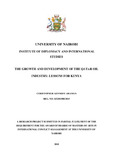| dc.description.abstract | The study examined the progress that Kenyan government has made towards managing oil drilling activities in Turkana County effectively in relation to Qatar oil case study. It established that while the government has made significant progress, it is yet to overcome the civil war challenge experienced in majority of the African countries that discover oil. To determine the manner in which the government need to enhance the process going forward, the study evaluated the Qatar oil case study and established that Qatar has been able to deal with its challenges by successfully developing its resources and having a visionary national leadership that is committed to the success of the oil project. In addition, it established that Qatar has been successful due to the vigorous and mutually rewarding relationship it has had with international partners and vigorous implementation of its oil related projects. Besides, it established that geopolitics in the Arabian gulf region together with high demand for oil from other parts of the world have also played critical roles in promoting the success of the oil industry in Qatar.
Besides the above, the study used the resource curse theory to evaluate the possible effects oil drilling activities in Turkana County. With the help of the theory, primary data was collected utilizing three different sets of questionnaires (one for local people, another one for government officials and another one for officials working at Tullow Oil Company). The Statistical Package for Social Scientists (SPSS) program was utilized to analyze the data. The study established that the main challenge related to the processes of harnessing oil and gas relates to synchronizing projects’ implementation and making the right strategic choices in contexts that sustain economic prudence while minimizing macro-economic distortions at the same time.
In line with the findings, the study recommends that the authorities that manage the oil project in Turkana should develop adequate national and local management capacity that would enable them to manage the project effectively and include local people/representatives in the management of the project. In addition, it recommends that given the non-renewability of the oil resources, the national government should do whatever it can to reduce corruption related deals in the project, demand for transparency and promote inter-generational equity in the management of the project. The study also recommends policy reforms and clear definition of arrangement of the provisions that govern community development and resource sharing together with the roles played by various stakeholders involved in the project. Additionally, policy reforms should be carried out to tackle the rights of the vulnerable people who might be affected negatively by the mining activities. The study also recommends the government and stakeholders to boost security since insecurity hinders development. Additionally conflict early warning systems needs to be put in place so as to avert violent conflict and address disputes and grievances | en_US |



